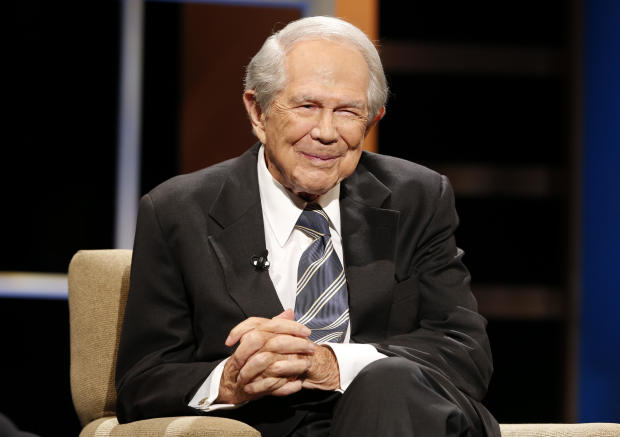Pat Robertson, a religious broadcaster who turned a tiny Virginia station into the global Christian Broadcasting Network, tried a run for president and helped make religion central to Republican Party politics in America through his Christian Coalition, has died, the network announced Thursday. He was 93.
Robertson died at his home in Virginia Beach, Virginia, early Thursday morning, according to the network. No cause was given.
Robertson’s enterprises also included Regent University, an evangelical Christian school in Virginia Beach; the American Center for Law and Justice, which defends the First Amendment rights of religious people; and Operation Blessing, an international humanitarian organization.
But for more than a half-century, Robertson was a familiar presence in American living rooms, known for his “700 Club” television show, and in later years, his televised pronouncements of God’s judgment on America for everything from homosexuality to the teaching of evolution.
The money poured in as he solicited donations, his influence soared, and when he moved directly into politics by seeking the GOP presidential nomination in 1988, he brought a huge following with him.
Robertson pioneered a now-common strategy of courting Iowa’s network of evangelical Christian churches, and finished in second place in the Iowa caucuses, ahead of Vice President George H.W. Bush.
AP Photo/Steve Helber
His masterstroke was insisting that three million followers across the U.S. sign petitions before he would decide to run, Robertson biographer Jeffrey K. Hadden said. The tactic gave him an army.
″He asked people to pledge that they’d work for him, pray for him and give him money,” Hadden, a University of Virginia sociologist, told The Associated Press in 1988. ″Political historians may view it as one of the most ingenious things a candidate ever did.″
Robertson later endorsed Bush, who won the presidency. Pursuit of Iowa’s evangelicals is now a ritual for Republican hopefuls, including those currently seeking the White House in 2024.
Robertson started the Christian Coalition in Chesapeake in 1989, saying it would further his campaign’s ideals. The coalition became a major political force in the 1990s, mobilizing conservative voters through grass-roots activities.
By the time of his resignation as the coalition’s president in 2001 — Robertson said he wanted to concentrate on ministerial work — his impact on both religion and politics in the U.S. was “enormous,” according to John C. Green, an emeritus political science professor at The University of Akron.
Many followed the path Robertson cut in religious broadcasting, Green told the AP in 2021. In American politics, Robertson helped “cement the alliance between conservative Christians and the Republican Party.”
This is a breaking news story. Check back for updates.
